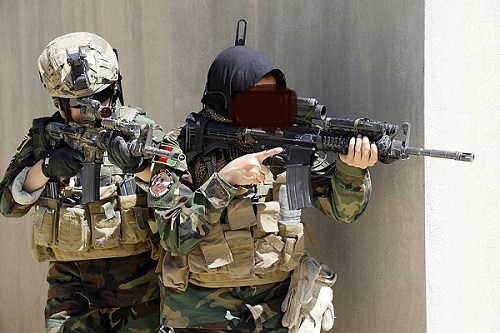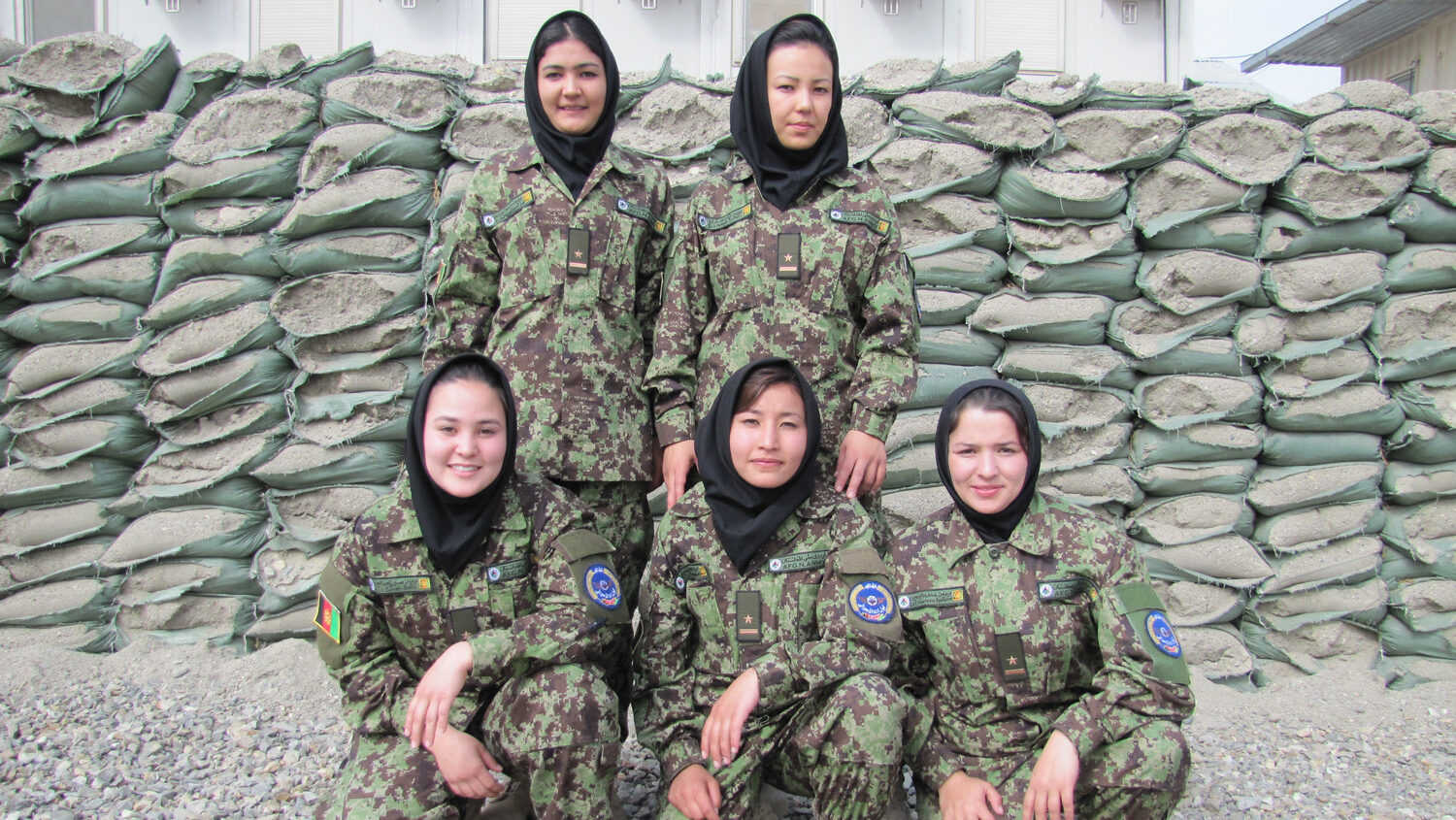Broken Promises and Betrayal: Female Afghan Special Forces Abandoned by NATO, Left in Perilous Limbo
Trained by US and British forces, female Afghan special forces face dire threats under Taliban rule
[Islamabad] The lives of female Afghan soldiers trained by the US and British special operations forces are in imminent danger.
In the aftermath of the collapse of the Ashraf Ghani-led regime in August 2021, the subsequent pullout of US troops, and the Taliban’s return to power, women who served in the Afghan National Army Special Operations Command have found themselves among the most vulnerable groups in the war-torn country.
Currently, these former female combatants face grave threats to their safety and well-being, as elements hostile to their crucial past roles in combating insurgency and terrorism in Afghanistan are aware of their identities.
The reasons for these women’s vulnerability are multifaceted, stemming from their roles in a military that was integral to the previous government as well as deeply ingrained cultural and religious norms that may view their service as unconventional.
The Taliban’s takeover of Afghanistan has further exacerbated the precarious situation these women find themselves in, as the group holds restrictive views regarding the role of women in society.
Under the Taliban, there have been increased threats against the majority of these women, many of whom were involved in high-risk operations as part of the Female Tactical Platoon (FTP), a key wing of the Afghan special forces.
Following a rigorous selection process, women from the Afghan Army and the Police Department were chosen to be part of the FTP.
The US and British special forces trained them; their intensive physical training entailed how to counter IEDs, guerilla warfare techniques, and skills in using a variety of cutting-edge weapons.
Although the US, British, and Afghan forces carried out covert operations together, the female special forces soldiers were instrumental in the operations.
When the Taliban regained control of Afghanistan, these women took refuge in Pakistan and other nearby countries, enduring extraordinary hardships to save their lives.
Despite living outside of their country, they still feel vulnerable today and afraid for their future.
The Media Line spoke with some of these female special forces, whose contributions to their country and allies will remain unsung tales. For their safety, all the women requested to keep their identities and residences confidential.
Senior NATO officials repeatedly assured us that we would be resettled in the UK or any other Western nation, but alas, they have abandoned us and left us unprotected
Ramiza was a sniper in the Afghan Elite Commandos Wing. She was trained by the US Green Berets and UK Special Forces and then deployed in a sniper platoon.
Before the Taliban came to power, Ramiza was known as a highly effective sniper, part of a covert unit of Afghan special strike forces. She also worked with NATO’s male operatives in a country where the majority of women do not leave the house without a male escort.
Ramiza told The Media Line: “Alongside NATO soldiers, we had combated the Taliban in Afghanistan. Senior NATO officials repeatedly assured us that we would be resettled in the UK or any other Western nation, but alas, they have abandoned us and left us unprotected.”
She added, “Like me, dozens of women combatants in the special forces have gone disguised to protect their families and themselves.”
Give the gift of hope
We practice what we preach:
accurate, fearless journalism. But we can't do it alone.
- On the ground in Gaza, Syria, Israel, Egypt, Pakistan, and more
- Our program trained more than 100 journalists
- Calling out fake news and reporting real facts
- On the ground in Gaza, Syria, Israel, Egypt, Pakistan, and more
- Our program trained more than 100 journalists
- Calling out fake news and reporting real facts
Join us.
Support The Media Line. Save democracy.


In August 2022, after a year of hiding and living in fear in Afghanistan, she quietly fled to Pakistan on foot.
In a distressed tone, Ramiza told The Media Line that “Pakistan has now also taken a hard stance on repatriating Afghan nationals. What will happen to individuals like me in such a scenario?” she asked.
We were sent across the country to hunt the Taliban and ISIS associates. It was a hazardous job.
Nasreen Rehmani, another female fighter currently living in exile, was residing with her family in a neighborhood of Bagram, Afghanistan.
To save her life, Rehmani fled to Iran, where she is residing unlawfully.
In 2010, she joined the Afghan Army, but due to her proficiency, Rehmani was later selected for a strike unit. Rahimi was among the first few female members of this unit and was trained by the US special forces.
Rehmani told The Media Line: “We were sent across the country to hunt the Taliban and ISIS associates. It was a hazardous job. We along with the male members of the team used to raid the houses of the suspects.”
Elaborating on her duties, Rahimi added, “We also searched the bodies of women and girls because intelligence reports suggested that women hid ammunition or drugs on their bodies. It often happened that some women blew themselves up during the search, which killed many of our fellow soldiers.”

Afghanistan’s Female Tactical Platoon members prepare to search a compound during a training exercise. (NATO photo by Martha Schaeffer, NSOCC-A)
Amina Khanum, who also served in the Afghan special forces, was trained by the British Army’s guerrilla unit.
A mother of two children, Khanum had to flee Afghanistan after the withdrawal of Western forces and is also living illegally in the suburbs of Tehran, Iran.
Khanum told The Media Line that after graduation, she was enrolled in the Afghan Army in 2016, and during training, she was selected to serve in the Afghan special forces. She repeatedly put her life in danger while working with the British Army. She said that throughout her service, she shot many Taliban.
According to Khanum, “After the Taliban took over Afghanistan, several women warriors were arrested shortly.”
She claimed that “though their survival is unknown, it is true that they certainly endured the worst kind of torture.”
Under the British Ministry of Defense Resettlement Scheme in 2022, Khanum applied for asylum in the UK, but it was denied by authorities.
To shed more light on the situation, The Media Line spoke with some analysts.
Ruhi Khan is a researcher at the London School of Economics and Political Sciences who focuses on decolonial feminism, contested visibilities, and new technology. She is also a fellow at the Royal Society for Arts in London and a Jefferson Fellow at the East-West Centre in Hawaii.
Khan told The Media Line that “the women, employed in the Afghanistan special forces against the Taliban fit in with the rhetoric of how America had ‘saved’ the poor Afghan women, yet the structural causes of gendered violence were not addressed, and safeguards were never really put in place.”
According to Khan, “Women in Afghanistan have been victims of epistemic violence on many fronts. It is also embedded in the way the West constructs the idea of an Afghan woman—in head-to-toe veils, symbolic of oppression and subjugation—to justify the American invasion of Afghanistan, but this war was never about saving Afghan women.”
She added that “when the US-led forces pulled out of Afghanistan, the focus of the Biden Administration was on the Americans; Afghan women were no longer a part of the discourse. Unfortunately, since Afghan women are no longer in the spotlight of the Western political gaze, they are not just abandoned but almost invisible.”
Arash Yaqin, a former UN advisor for the Afghan Foreign Ministry who is now based in Washington, D.C., told The Media Line: “In addition to being the biggest military and political setback in US foreign policy, the 20 years of the US-led war in Afghanistan has caused moral harm to American veterans who are forced to desert their Afghan allies after the Taliban seized all of their victories.”
He further said that “with the irresponsible withdrawal from Afghanistan, the West abandoned their female military colleagues who fought with them shoulder-to-shoulder.”
Yaqin added that “in a male-dominated society, despite cultural and family taboos, numerous brave Afghan females decided to join the Afghan Security Forces to protect their homeland. These courageous women now, ironically, have to run for their lives from the Taliban.”
“While considering the War in Ukraine and the Middle East, the Afghanistan withdrawal debate is slowly dying in Washington, the American political and military leadership still have a moral obligation to relocate these brave female warriors,” he concluded.
Lutfullah Zadran, a former member of the Afghan special forces, explained to The Media Line: “According to Afghan norms and culture, it is quite unacceptable for alien men to enter homes without permission. Therefore, women warriors played an effective role in joint combat and search operations.”
Zadran added that “although the local Afghans frequently protested the search tactics, they were happy to see these women recruited into the special forces.”
Zadran went on to say that “although the US had evacuated a large number of these female fighters from Kabul as per their pledge, around three dozen of the women who fought alongside American and British forces remain missing. The British military’s contribution to this situation is regretful; these women are living in appalling conditions because the British haven’t followed through on their relocation pledge.”
NATO had both the moral responsibility and the practical stake of ensuring that all of their allies had been taken to security along with their families
Irina Tsukerman, a New York-based national security expert, a South Asian expert, and a human rights lawyer, told The Media Line: “What happened to these women soldiers is part of a far greater scandal than even the collapse of the Afghan state and the deals with the Taliban, which ultimately brought it to power.”
“NATO had both the moral responsibility and the practical stake of ensuring that all of their allies had been taken to security along with their families,” she added.
She asserted that “deserting allies, particularly vulnerable ones who had been depending on Western support, amounts to betrayal and will cost NATO countries credibility and goodwill.”
Tsukerman concluded, “There is no specific logic or reason why these women could not be relocated.”
According to Tsukerman, the US has accounted for millions of unvetted illegal migrants over the borders in the last few years alone, and it has no shortage of territories where a relatively limited number of allies could have taken refuge.

